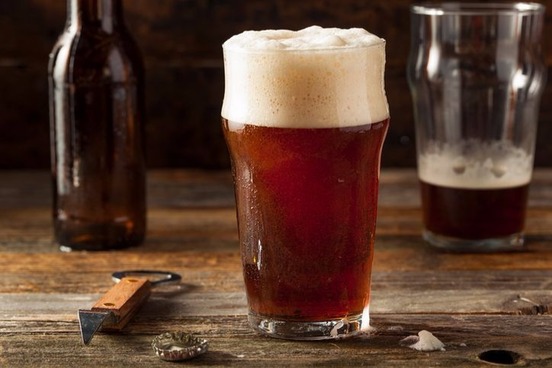
Ale
The second-oldest sense of ale is "a festival or feast" at which, as you might guess, a prominent activity was the drinking of ale. In medieval times, there were many kinds of ales in this sense—among them, dirge ales, midsummer ales, and May Day ales. The historian G. M. Trevelyan tells us that in the 15th century "church ales" were a common means of raising funds for the parish.
Similarly, "bride-ale" (in Old English as brydealu) referred to a wedding feast. Eventually it broadened to include the whole proceedings of a wedding and today we know it as the adjective bridal.
I did not smell any spirits; I had drank a pint of ale; I had been swilling ale and not spirits [a laugh].
—The Morning Chronicle (London, Eng.), 27 Jul. 1825

Bash
Perhaps bash is a blend of bang and smash, but then again, why can't it simply be of echoic origin? No one knows for sure. Another head-scratcher is how bash, as a word for a "forceful blow," acquired its "festive" sense in American slang. Although that's a bit hazy, print evidence shows that the sense probably developed overseas during World War II and was brought to the U.S. by returning troops.
Lieutenant Joe Klass, a young American Spitfire pilot, wrote … late in May of the new colloquial vocabulary of American prisoners of war in German camps, [including] bash, banquet.
— American Speech, 1944
By mid-20th century, it has been noted that New Zealand university students were also using bash as a name for a party, so a corresponding development in American slang doesn't seem far-fetched.
Count Basie wasn't the most surprised party at the poolside birthday bash his wife threw for him Thursday. So many vet musicians were in attendance, it was like old-timers day and a dead age give-away for the Count, who wouldn't tell.
—New Pittsburgh Courier (Pittsburgh, PA), 27 Aug. 1960

Luau
Aloha! In Hawaiian, the word lū'au refers to the leaves of the taro plant that are commonly cooked with coconut cream and chicken or octopus. The dish is a staple at a pā'ina, meaning "a small dinner party" in Hawaiian, and at an 'aha'aina, "a banquet." ('Aha, means "gathering," and 'āina, "meal.") Apparently, lū'au was a hit at aha'ainas, since people began applying the taro dish’s name to the feast in the mid-19th century.
Feasting and riding principally occupied the attention of the natives. Luau parties were numerous in all directions, and there were but few in Honolulu who did not participate in this national mode of enjoying a holiday.
— The New York Daily Tribune, 20 Oct. 1851
The traditional luau is an outdoor feast usually eaten on mats (and without utensils) and includes lots of food—including lū'au, poi (another dish made from the taro plant) and the kālua pig—and, of course, festive traditional song and hula.

Kaffeeklatsch
If you're a regular at the coffee shop, you've seen kaffeeklatsches. They're the groups of casual coffee drinkers sitting around, chatting about the topics of the day or what's been going on in their personal lives.
Several downtown kaffeeklatsches on Main Street could be overheard this week discussing the possibility of a Batman statue. And a few sipping their early morning coffee wondered out loud whether it might be even better to set up a giant Bat Signal at City Hall (like the one Police Chief Clancy O'Hara used to signal Batman) that could be shined on the Marcus Whitman Hotel or the clouds in the night sky on special occasions.
— The Walla Walla Union-Bulletin, 15 June 2017
Kaffeeklatsch is a late 19th-century borrowing from German that has been semi-Anglicized in various spellings over the years, including coffee-clatch, coffee-klatsch, and coffee klatch. German Klatsch means "gossip," so the word literally refers to "coffee gossip."
Klatch itself was borrowed into English as a word for a gathering for informal conversation in the 1940s.
The topics mulled over in these intermission klatches are as varied and no more or less inspired than any gab going on in the parlor of any fairly intelligent family.
—Jack O’Brian, News-Pilot (San Pedro, CA), 14 Oct. 1948

Beanfeast
In British English, beanfeast can refer to an annual dinner given to employees by their bosses or to any festive occasion or dinner.
In the afternoon [The Boys Brigade] were once again free to visit Blackpool arriving back at camp at 7:30 in time for the annual beanfeast. The beanfeast is an opportunity for the Boys to entertain their friends, both old and new. The highlights were Bugle playing, quiz, various challenges, songs, jokes and magic shows.
— David Knox, The Border Telegraph, 27 Aug. 2017
If you have seen the 1971 film Willy Wonka & the Chocolate Factory, you might recall that the spoiled-rotten character Veruca Salt wanted one. In the film, she sings "I want a feast, I want a beanfeast. Cream buns and doughnuts and fruitcake with no nuts, so good you could go nuts."
In the past, a beanfeast was a festival observed in parts of Europe on the evening before Twelfth Night. According to religious doctrine, Christmas festivities last until the twelfth day after Christmas—that is, until the Epiphany—the day commemorating the coming of the three kings to the infant Jesus Christ and during which people gave themselves over to feasting and merrymaking. One of the customs of Twelfth Night—the evening of Epiphany—was to make a special cake in which a bean was placed. The cake was then distributed and the man having the piece with the bean was crowned “king" for the night. Sometimes a pea was placed in the cake and the woman finding the pea in her piece was coronated "queen."
The chaplain of a ship of war left an enlightening record of such a Twelfth Night celebration in a January 6, 1676 entry of his journal:
For this day being 12 Day ... wee had much myrth on board, for wee had a great kake made, in which was put a beane for the king, a pease for the queen, a cloave for the knave.… The kake was cutt into severall pieces in the great cabin, and all putt into a napkin, out of which one took his piece, as out of a lottery, then each piece is broken to see what was in it….
— From The London Literary Gazette, 12 Mar. 1825

Hangout
It does an infinite deal of good to see so much space occupied in the Cincinnati Times explaining how Rutherford B Hayes came to make so small a hang-out on so large a wash.
—Plain Dealer (Cleveland, OH), 7 Sept. 1876
Standard reference dictionaries do not define hang-out as "a party"; however, a number of historical dictionaries, including the Oxford English Dictionary and J. S. Farmer's Slang and Its Analogues, provide entries for this now-obsolete sense (Farmer defined it as "a feast" or "an entertainment").
This "party" sense of hangout has been recorded as far back as the middle of the 19th century; we currently do not have evidence of the modern sense ("a place frequented for entertainment or for socializing") until the late 19th century.
The smell is something awful. The hallways are "hang-outs" for all the hoodlums of the neighborhood.
—Irish American, (New York, NY), 25 Dec. 1886

Gaudy
Perhaps you didn't know that the adjective gaudy has a related noun form. That's understandable since the noun is not commonly used, especially in American English. Gaudy is ultimately from Latin gaudium, meaning "joy," which, in turn, is derived from gaudēre, meaning "to rejoice."
In 15th-century English, the noun gaudy was used in reference to a gaud, one of the larger and more ornamental beads in a rosary marking the five joyful mysteries. That sense of gaudy eventually came to refer to any ornament.
Of the least of these welkes or perewincles, they make certayne litle beades, of dyuers sortes and colours: they make also litle bracelets, which they myngle with gaudies of golde, these they rowle about theyr armes from the elbowe to the wrest of the hande.
—Pietro Martire d’Anghiera, The history of trauayle in the VVest and East Indies, 1577
In the 16th and 17th centuries, the word returned to its Latin roots and was used to refer to acts of rejoicing. From that sense, the noun gaudy was applied to feasts and festivals and then, specifically, to festive occasions at British universities. Nowadays, gaudies are usually formal dinners celebrating alumni reunions.
A couple of weeks ago I returned to my old Oxford college for a 'gaudy'—posh, Oxford-speak for a reunion. This one was for those of us who came up to Brasenose in 1983, 1984 and 1985. That group includes the Prime Minister but, not surprisingly, he wasn't there. I imagine he didn't want to risk being photographed at a black-tie dinner with a bunch of his Oxford pals in the middle of a general election campaign—or maybe he just finds these occasions a bit of a bore.
— Toby Young, The Spectator, 30 Apr. 2015

Blowout
Blowout is a 19th-century formation based on the familiar verb blow, relating to the movement of air or the expelling of air forcefully. With a little imagination, we can see how forcefully blowing out air gave life to blowout as a word for a burst of anger—or, even better, blowing a gasket or blowing your top or stack. That sense of the word isn't used as much in modern times, but it was fairly popular in the 19th century.
Blowout can also refer to an extravagant dinner or feast, with use dating to the early 19th century.
O—ay—yes—I recollect—we had a blow out here last Sunday, and half a dozen troublesome fellows, they called justices, were done for by the brave rowdies.
—James Kirke Paulding, John Bull in America, 1825
We suspect that the "feast" sense has something to do with consuming an abundant amount of food and drink in one burst (referring to that word's sense of "a sudden intense effort"). Nowadays, this sense of blowout for one-off indulgence usually designates a major festive occasion.
As trends in luxury spending have moved from clothes and jewelry and cars to experiences (such as food and travel), it hasn't hurt that Leon and Lim throw a good party. To mark the 2008 Beijing Olympics, they held a seventy-two-hour blowout on Howard Street, complete with Scrabble tournaments and astrological readings.
— Emma Allen, The New Yorker, 20 Mar. 2017
In the 20th century, blowout came to refer to the catastrophic bursting of air from a tire and to an uncontrolled eruption of an oil or gas well. Those applications of the word led to senses referring to failure or debacle.
This "failure" sense was picked up by sports writers in the early 1900s who began describing crushing losses as "blowouts," which led to the common phrase "blowout victory" for any sports (or political) contest won by a wide margin.

Wingding
Decades before the late 20th-century introduction of the wingdings computer font, the word wingding was an American slang word for a feigned seizure or fit by a drug addict.
Drug addicts, driven to desperation by craving, often execute what the underworld calls “wing dings.” That is, they simulate epileptic seizures along the street in hope that arriving ambulance doctors will administer hypodermic injections as first aid.
—The North Adams Transcript (North Adams, MA), 12 Apr. 1930
It has been speculated that the word is a reduplication of wing, possibly associating the spasmodic movement of the fit with the flapping of a bird's wings. Additionally, the word was used to describe a fit of rage and frustration. Either way, we can only guess that the wing-dinger's wild movement or behavior brought on the "wild party" sense of wingding in the 1930s.
Frank Sullivan, Lawrence, new state commander of the American Legion, will make his first official visit to a Kansas Legion post when he comes to Belleville tomorrow night to attend the annual whingding and commander's banquet of Post No. 133.
— The Belleville telescope (Belleville, KS), 19 Oct. 1933

Blast
Blast goes back to Old English as a word for a violent gust of wind. That use blew in other "windy" senses—a common one being "the blast of a trumpet," referring to the sound made when blowing air into a wind instrument. In the 17th century, the word came to refer to artificially produced currents of air, as those produced in organ pipes and in factory furnaces. When a furnace is said to be "in blast," it is at work or in full operation, giving us the figurative expression "full blast.”
So a tall Oak, the pride of all the Wood,
That long th' Assault of several Storms hath stood;
Till by a Mighty Blast more pow'rfully push't,
His Root's torn up, and to the Earth he rusht.
— Sir Robert Howard, The Duel of the Stags, 1668
The "blowing up" sense of blast also burst onto the scene in the 17th century. No doubt, it was the attention-getting sound and impact of such blasts that led to the word being used for a boisterous party or an uproariously good time beginning in the mid-1900s.
That's a blast, ain't it?
— P. Wolff, Friend, circa 1950I decided to throw a small blast.
— Harlan Ellison, Love Ain't Nothing But Sex Misspelled, 1968"The cops saw us so we had to ditch," she wrote, adding, "Everyone was the party … what a blast … everyone was drunk."
— San Francisco Chronicle, 15 Mar. 1958

Rave
Early use of the verb rave goes back to the Middle Ages and referred to acts of madness. The Oxford English Dictionary cites an early use in Geoffrey Chaucer's epic poem Troilus and Criseyde: "Ye ben so wylde, it semeth as ye rave." By the 17th century, the connotation of rave ameliorated to "wild" enthusiasm, and people began raving about things that they greatly enjoyed.
It wasn't until the 20th century that the "enthusiastic" meaning lent itself to the noun rave, which is widely used to refer to favorable criticism (as in "rave reviews") and goes back to the 1920s.
Immediately Audrey's moan was heard, her coin popper got to work again, starting with a rave in the New York Sunday American Magazine, running week by week and very weak, about her "studio exposure," how and when to pose and what to show.
— Variety, 10 Jun. 1921
Ultimately, this use of rave led to the word being applied to a party involving energized dancing and excessive drinking. By the close of the 20th century, raves transcended to overnight affairs featuring techno and the use of mind-altering drugs.






